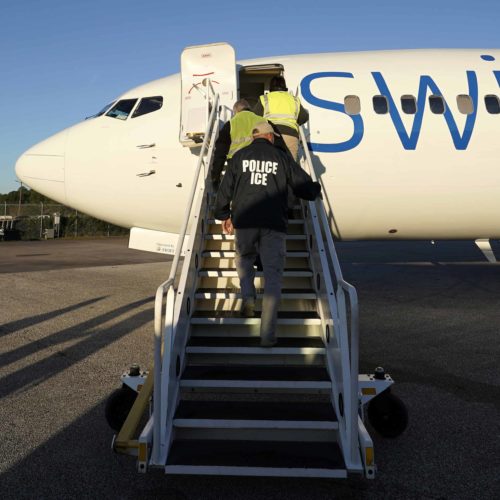Introduction
Deportee Luis Alonzo Tábora was still wearing the shoes that U.S. Immigration and Customs Enforcement gave him when he was shot and killed in Honduras on Sept. 22.
ICE had put him on a flight from the United States that had landed just hours earlier in Honduras, a country reeling from one of the highest homicide rates in the world.
Tábora isn’t the first Honduran deportee killed. His murder is one of many tragic endings for deportees fueling criticism that a series of new deportation deals with unstable Central American countries, called “third-country” agreements, violate U.S. asylum laws and will lead to more deaths.
The latest deal is with Honduras, a tiny country with little leverage to argue with the United States. Announced Sept. 25, just three days after Tábora’s killing, the agreement requires Honduras to accept any foreigner ICE deports if that person first traveled through Honduras and didn’t seek and obtain asylum there. Honduras is adjacent to Guatemala, which borders Mexico. Asylum-seeking deportees could potentially include Salvadorans, Nicaraguans or Venezuelans who passed through Honduras en route to the United States.

The Trump administration recently cut similar deals with Guatemala and El Salvador, two countries from which migrants say they’re also fleeing violence and dysfunctional justice systems.
“Where will they declare a haven for asylum seekers next? Syria? North Korea? This is cynical and absurd,” said Eric Schwartz, president of the advocacy group Refugees International.
On Tuesday, acting Customs and Border Protection Commissioner Mark Morgan called most migrants arriving at the U.S. border “economic migrants.” He said U.S. “personnel” are helping Central American countries with “law enforcement activities” as well as with “asylum capabilities” to benefit migrants found to merit refuge. The deals are designed to force, for example, a Honduran to seek asylum in Guatemala, or a Salvadoran to seek asylum in Honduras or Guatemala.
The United States has an agreement with Canada requiring asylum seekers to apply in whichever of the two countries they first set foot in, with some exceptions. But by objective standards, Central American countries aren’t safe havens, critics of Trump’s new deals argue.
Because of that, the deals could be challenged in court on grounds that that the U.S. Immigration Act requires that the asylum process in such partner countries “be safe, full and fair,” said Lee Gelernt, deputy director of the American Civil Liberties Union’s Immigrant Rights Project.
Honduras, for its part, is awash in gang violence and its public security forces are accused of serious rights violations. A U.S. attorney recently accused the Honduran president’s brother of corruption, and the U.S. State Department advises Americans against traveling to Honduras. Over the last year, nearly 182,500 Honduran minors or adults traveling as families were detained at the U.S. border, where many asked to apply for asylum.
So far, there’s little sense of how the deportation agreements will play out.
“We’re talking about a significant number of people being deported back — not to their own countries,” said Geoff Thale, vice president for programs at the Washington Office on Latin America, a policy think tank. “It’s hard to imagine how these countries are going to absorb these numbers. Even if they’re granted asylum, it’s not clear how safe they’ll be.”
“It’s hard to imagine how these countries are going to absorb these numbers. Even if they’re granted asylum, it’s not clear how safe they’ll be.”
Geoff Thale, vice president for programs at the Washington Office on Latin America, a policy think tank
Thale noted that migrants often head to the United States because they have family there. If they end up dropped back into Central American countries to ask for asylum, he said, they could fall victim to gangsters who know it’s common for U.S. relatives to send migrants money to survive.
The country deals are part of a broader Trump campaign to chip away at the U.S. asylum system developed after World War II, when thousands of Jewish refugees fleeing persecution were turned away from U.S. shores. Congress has shaped bipartisan asylum policy since then, along with courts.
On July 15, the administration issued an interim rule blocking admission of asylum seekers who traveled through another country en route to the United States unless they applied for asylum elsewhere and were rejected. The U.S. Supreme Court decided last month that the rule could remain in effect, for now, while legal challenges proceed.
“Virtually everyone at the southern land border has traveled to a third country,” and the rule would “effectively end asylum in the United States,” according to the ACLU’s Gelernt, who is leading the challenge to the rule.
On July 26, the administration announced its deal with Guatemala, where the agreement has been challenged in Guatemala’s constitutional court. The El Salvador deal was announced Sept. 20. U.S. officials said that only migrants who traveled through El Salvador would be deported there, but critics warn that the deal’s language is so broad that people who never set foot in the country could end up there.
Thale doubts these deals will stop migrants fleeing true threats. “Smugglers will adapt. People will go through more dangerous areas,” he said. “It will not stop migration fundamentally because the conditions driving people are not being addressed.”
Read more in Inequality, Opportunity and Poverty
Immigration Decoded
Rhetoric attacking immigrants has been on constant boil for years
Commentary: The El Paso shooter’s alleged anti-Hispanic screed echoes Trump and some media rhetoric.
Immigration Decoded
Babies in poor health at ICE-run detention facility, says complaint
Advocacy groups want mom and kids released from Dilley, Texas center; government says comprehensive care is being provided.



Join the conversation
Show Comments
when people go thru more dangerous areas–it is their own choice–there is danger in many other countries as well as in the US–that is not true asylum and they need to go back and fight for their country